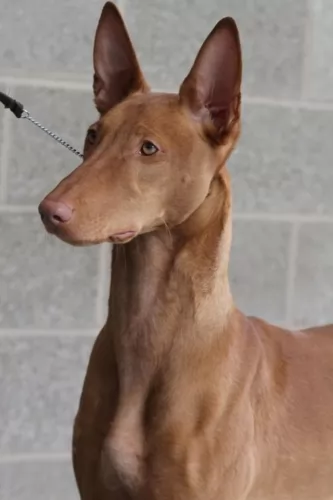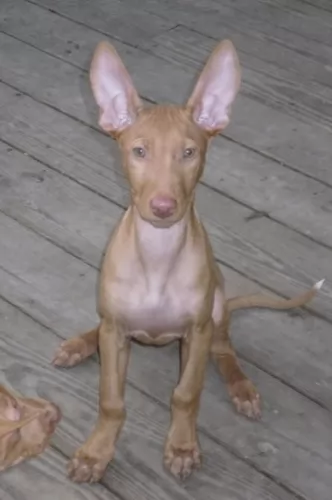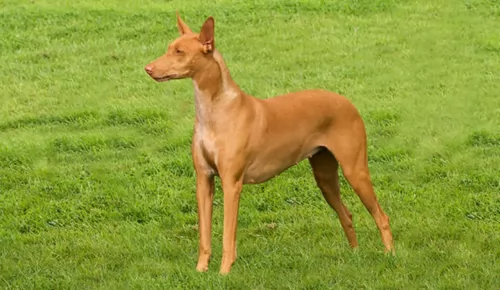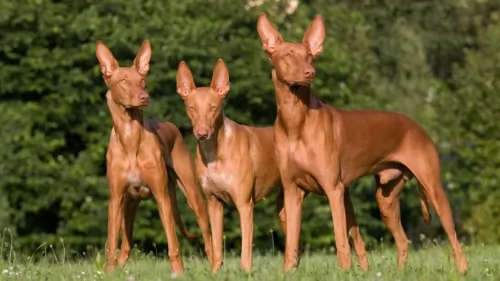 Petzlover
Petzlover Pharaoh Hound is originated from Malta but Pudelpointer is originated from Germany. Both Pharaoh Hound and Pudelpointer are having almost same height. Both Pharaoh Hound and Pudelpointer are having almost same weight. Both Pharaoh Hound and Pudelpointer has same life span. Both Pharaoh Hound and Pudelpointer has same litter size. Both Pharaoh Hound and Pudelpointer requires Low Maintenance.
Pharaoh Hound is originated from Malta but Pudelpointer is originated from Germany. Both Pharaoh Hound and Pudelpointer are having almost same height. Both Pharaoh Hound and Pudelpointer are having almost same weight. Both Pharaoh Hound and Pudelpointer has same life span. Both Pharaoh Hound and Pudelpointer has same litter size. Both Pharaoh Hound and Pudelpointer requires Low Maintenance.
 The Pharaoh Hound hails from Malta and is the national dog there. These dogs are rare and are looked upon as endangered. Because they are a primitive type dog, they enjoy good health.
The Pharaoh Hound hails from Malta and is the national dog there. These dogs are rare and are looked upon as endangered. Because they are a primitive type dog, they enjoy good health.
It has always been used as a hunting dog for rabbits. The dog has been recreated from mixing a combination of other breeds. It certainly seems to be an ancient dog breed, having existed for more than 2 000 years.
It is thought that the dog was imported to Malta by Phoenician traders. The dog has been classified as a member of the sighthound group, and arrived in England in the 1930s and to the USA in 1967. The breed was also officially recognized by the American Kennel Club in 1984.
 The Pudelpointer is cross between the Poodle and the English Pointer. The first Pudelpointer was bred in 1881 by Baron Von Zedlitz in Germany.
The Pudelpointer is cross between the Poodle and the English Pointer. The first Pudelpointer was bred in 1881 by Baron Von Zedlitz in Germany.
The idea was to bring about a gun dog highly skilled in tracking and retrieving. The Pudelpointer was introduced to North America in 1956, and in 1977 the Pudelpointer Club of North America was established.
Because breeders have avoided recognition by the American Kennel Club, the Pudelpointer never became a well known breed in the United States.
 The Pharoah Hound is an elegant looking dog standing at roughly between 53 and 63cm and weighing 18 to 27kg.
The Pharoah Hound is an elegant looking dog standing at roughly between 53 and 63cm and weighing 18 to 27kg.
They are sleek dogs without any bulkiness about them and the coat is tight fitting with short smooth hair. The coat is a tan or red color, the eyes bright and the color of amber. The ears are fairly large and erect and the long tail slim with sometimes a white tip. The skin can be thin so the dog can be sensitive to the cold.
The neck of the dog is long and lean, as are the legs. An interesting aspect with this dog is that when the dog becomes excited its ears and nose become bright pink.
Pharoah Hounds are calm dogs and they can live in the city or in the countryside. They love kids and will be a wonderful playmate for them. Once he has had a lot of exercise and play, he is the kind of dog that will settle down happily with his human family for some quiet time.
Just as with any other dog, he will require training and socialization to make him obedient and better behaved.
 The Pudelpointer stands at between 55 and 68cm in height and weighs between 20 and 30kg. He is a medium sized dog with a weather resistant, double-layered coat. The coat doesn’t shed much and is usually a brown, chestnut, liver or black color.
The Pudelpointer stands at between 55 and 68cm in height and weighs between 20 and 30kg. He is a medium sized dog with a weather resistant, double-layered coat. The coat doesn’t shed much and is usually a brown, chestnut, liver or black color.
The coat is usually dense, harsh and wiry. They have floppy ears with quite a unique feature - the mustache on the muzzle. The tail is docked, with about 30% being removed, giving the dog an attractive, distinctive look.
Full of energy, the lively Pudelpointer will love to find himself in a family where they are active, outdoorsy types. He loves water too, and when out on a hike, if there’s water around, he’ll be the first to jump right in.
He’s an intelligent dog too, eager to please and ready to learn. He can easily be trained and socialized. He is loyal, calm and loving and will get on well around children and other animals in the home. He is also protective and makes a good watchdog.
 The Pharaoh Hound is quite interesting in a number of ways and he is independent, strong-willed and able to entertain and amuse himself.
The Pharaoh Hound is quite interesting in a number of ways and he is independent, strong-willed and able to entertain and amuse himself.
He loves to join in with the children and be part of their games. He’s intelligent and easily trained and he is also low maintenance.
While he’s not the most attractive dog to many people, others look at him as a true beauty. Whatever your opinion is, he will still make you a good family friend.
 The Pudelpointer may well be a gun dog but when it comes to his human family he is a social, loving companion.
The Pudelpointer may well be a gun dog but when it comes to his human family he is a social, loving companion.
He is intelligent too and can be easily trained. When at home with his human family, he is calm and content. He will however need lots of exercise and mental stimulation. In exchange for your love and care, he will be a good watchdog, protector, pet and friend.
 Pharaoh Hounds are uncommon outside of the Maltese Islands and with very little irresponsible breeding, these dogs are virtually free of genetic diseases. A common dog illness to look out for includes -
Pharaoh Hounds are uncommon outside of the Maltese Islands and with very little irresponsible breeding, these dogs are virtually free of genetic diseases. A common dog illness to look out for includes -
Your Pharaoh Hound can suffer from patella luxation, and in more severe cases it can be painful and even be disabling for a dog. This ailment comes about when the kneecap is dislocated from its normal position. You’ll find your dog lifting his hind leg quite a bit. Unfortunately this problem can lead to arthritis developing.
Other illnesses to look out for are bloat, cancer, skin allergies and ear infections.
 The Pudelpointer is active and healthy and can live up to 14 years and maybe even longer with good care.
The Pudelpointer is active and healthy and can live up to 14 years and maybe even longer with good care.
Owners will do well to know about a couple of the common dog illnesses that can strike at any time -
Some dogs are more at risk for bloating. Larger dogs with deep chests are at greater risk. To help with preventing this deadly ailment, feed your dog a couple of smaller meals a day instead of one big meal that he gobbles up quickly.
Bloat is a medical condition which comes about with a rapid accumulation of gas in the stomach. Canine bloat or gastric dilatation and volvulus is a killer disease. The accumulation of gas can cause the stomach to twist and the dog can go into shock.
Your dog will be trying to vomit, he’ll be panting and pacing, drooling with a hard, swollen stomach.
This is a common illness or condition seen in many dogs, young and old, large and small.It’s a disease which can lead to pain, arthritis and lameness.
The Pudelpointer has floppy ears and loves swimming. The floppy ears are at risk for developing ear infections. Check inside the ears that they aren’t red or have a discharge. Your dog will be scratching his ears a lot.
 The Pharaoh Hound’s short coat is easy to groom and it will require a brushing at least twice a week just to get rid of loose hairs.
The Pharaoh Hound’s short coat is easy to groom and it will require a brushing at least twice a week just to get rid of loose hairs.
At the same time trim his nails, check inside his ears for infection and look inside his mouth for any rotting teeth.
Your Pharaoh Hound is an active, energetic dog and he will need a good dose of exercise every day. Take him with you on your walks or allow him to join you with your hikes, jogging or cycling. At home involve him in some ball games.
How much any adult dog eats will depend on a number of factors such as size of dog, age and his activity levels.
You get some excellent dog kibble these days on the market but the idea is to choose one of the high quality ones which have minerals and vitamins in them. Home-made food is also good for your pet and this should be kept simple, consistent and nutritious.
Every now and then you can add in some boiled chicken, brown rice or pasta and sweet potato, carrots and spinach to the kibble. Some raw meat added in can also be of benefit to your dog’s health.
Stay away from spicy, exotic foods and keep your dog's food easy like suggested so as to avoid digestive problems
 Brush your PudelPointer twice a week to get rid of loose hairs.
Brush your PudelPointer twice a week to get rid of loose hairs.
Grooming can be an awesome bonding experience for you and your dog. While you’re brushing him, check him over for any unusual lumps.
Trim the nails if they don’t wear down naturally themselves.
Check inside the mouth for rotting teeth which can be a source of pain and lot of diseases in the body.
Exercise is very important and can come in the form of a walk every day or hikes, swimming as well as ball- and rope games and hide-and-seek.
Provide your dog with a nice warm, comfortable place to sleep.
Your PudelPointer can get to 14 years of age with good food. While you do get some excellent commercially manufactured dog foods, you want to be sure your pet gets some nutritious home-made food too.
Make sure that the kibble is the high quality ones with lots of vitamins and minerals. Boiled chicken, brown rice or pasta and spinach, sweet potatoes and carrots are a healthy choice for your pet – plain and simply just like dogs love it. Chop it up and add it into the dry kibble a couple of times a week.
Some raw meat added in from time to time will help his skin and coat remain healthy. Never leave him without a constant source of fresh, cool water.